Words that have the suffix ible – Words that have the suffix “ible” hold a unique place in the English language, offering a rich tapestry of meanings and applications. From the familiar “possible” to the more obscure “convertible,” these words possess a remarkable ability to transform their root words, imbuing them with shades of possibility, capability, and suitability.
Embark on a linguistic journey as we delve into the fascinating world of words that have the suffix “ible,” uncovering their nuances, variations, and the captivating role they play in our communication.
Throughout this comprehensive exploration, we will unravel the intricacies of the suffix “ible,” examining its diverse variations and their impact on word formation. We will identify common synonyms and antonyms, delving into their morphological structure and exploring their versatile roles as different parts of speech.
Real-world examples will illuminate the practical usage of these words in various contexts, showcasing their ability to convey subtle meanings and enhance our expression.
Suffix: ible
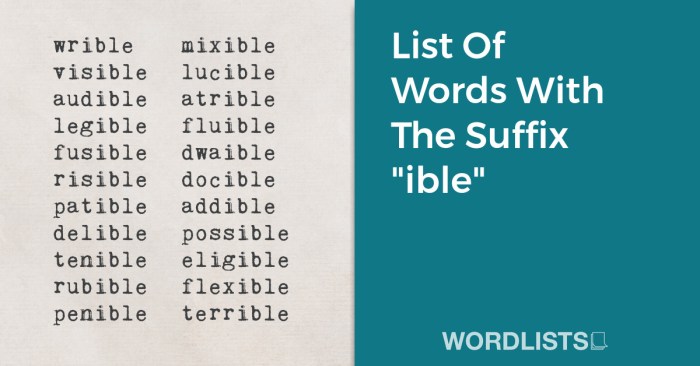
The suffix “-ible” is used to form adjectives that describe something that can be done, achieved, or experienced. It is often used to describe something that is possible or feasible.
Examples of Words that End with the Suffix “-ible”
- Possible– capable of being done or achieved
- Credible– believable or worthy of trust
- Flexible– capable of being bent or shaped without breaking
- Compatible– able to exist or work together without conflict
- Visible– able to be seen
Variations of Suffix
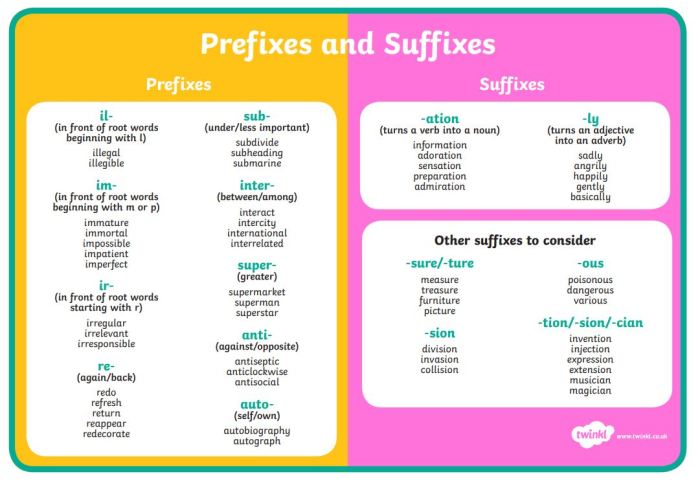
The suffix “ible” can exhibit several variations in spelling and pronunciation, each serving a specific purpose in word formation. These variations include “-able,” “-ible,” and “-uble,” and their usage depends on the root word and its origin.
The “-able” Variation
The “-able” variation is the most commonly encountered form of the suffix “ible.” It is typically used with verbs to form adjectives that indicate capability, possibility, or suitability. For instance, the word “readable” implies that something can be read, while “likeable” suggests that someone is worthy of affection.
The “-ible” Variation
The “-ible” variation is often employed with adjectives to create nouns that express a quality or characteristic. Examples include “sensible” (indicating a rational or logical person) and “terrible” (denoting something that inspires fear or awe).
The “-uble” Variation
The “-uble” variation is relatively less common and is primarily used with a small group of words, including “soluble” (capable of being dissolved) and “combustible” (able to burn). It is typically associated with words of Latin origin.
Synonyms and Antonyms: Words That Have The Suffix Ible
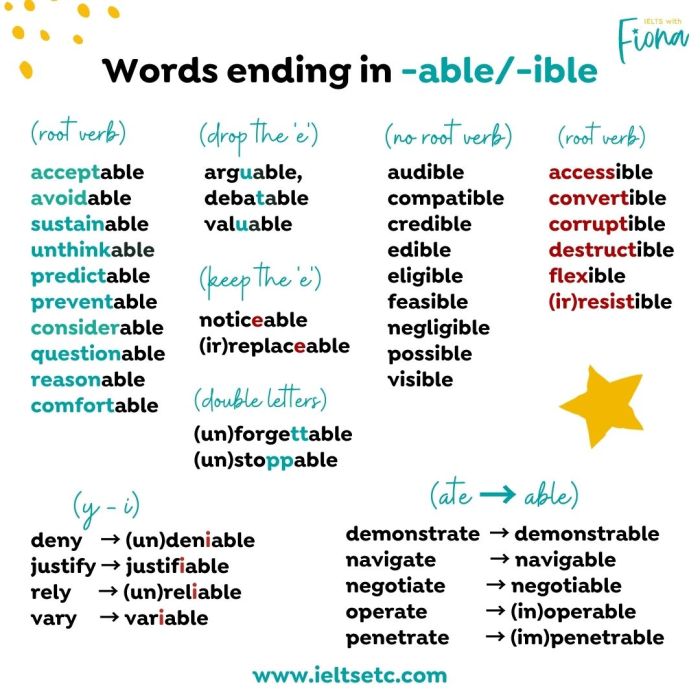
Words ending with the suffix “ible” often have synonyms and antonyms that share similar meanings. Understanding these relationships can enhance vocabulary and improve communication.
The following table provides a list of common synonyms and antonyms for words ending with “ible”:
Synonyms
| Word | Synonym |
|---|---|
| Audible | Hearable |
| Combustible | Flammable |
| Compatible | Congruent |
| Credible | Believable |
| Desirable | Appealing |
Antonyms
| Word | Antonym |
|---|---|
| Audible | Inaudible |
| Combustible | Incombustible |
| Compatible | Incompatible |
| Credible | Incredible |
| Desirable | Undesirable |
Morphological Analysis
Words with the suffix “-ible” exhibit a consistent morphological structure, composed of a root word, prefixes (optional), and the suffix itself. Understanding this structure is crucial for comprehending their formation and meaning.
Root Words
The root word forms the core of an “-ible” word and conveys its fundamental meaning. Common root words include:
- aud-(hear)
- cred-(believe)
- vis-(see)
- flex-(bend)
Prefixes
Prefixes, when present, modify the meaning of the root word. Some common prefixes include:
- in-(not)
- un-(not)
- com-(with)
- re-(again)
Suffix
The suffix “-ible” indicates that the word describes something capable of being done or experienced. It is often used to form adjectives from verbs.
For example, the word “visible” is formed from the root word “vis-” (see) and the suffix “-ible”. This indicates that something is capable of being seen.
Part of Speech
Words ending with the suffix “ible” can function as various parts of speech, including adjectives, nouns, and verbs. Understanding their part of speech is crucial for accurate usage and interpretation in different contexts.
Below is a detailed breakdown of how “ible” words function as different parts of speech, with examples to illustrate their usage:
Adjectives
As adjectives, “ible” words describe nouns or pronouns, indicating a quality or characteristic. They typically end in “-ible” and denote capability, possibility, or suitability.
- Compatible:The two systems are compatible with each other.
- Credible:The witness gave a credible account of the events.
- Sensible:It is sensible to take precautions before embarking on the journey.
Nouns
Some words ending in “ible” can function as nouns, referring to a specific entity or concept. They are often formed by adding “-ible” to a verb stem and represent the result of an action or process.
- Convertible:The convertible was parked in the driveway.
- Collectible:The rare stamps are valuable collectibles.
- Inedible:The mushroom is inedible and should not be consumed.
Verbs
A small number of words ending in “ible” can function as verbs, expressing an action or state of being. These verbs typically have an “-ible” ending and indicate the ability or possibility of performing an action.
- Enable:The new technology enables us to communicate more efficiently.
- Inhibit:The cold weather inhibited our ability to work outside.
- Prohibit:Smoking is prohibited in public places.
Usage in Context
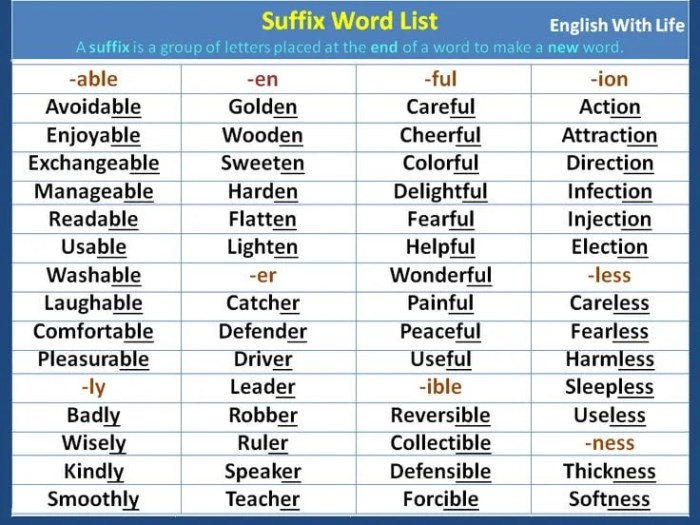
Words with the suffix “-ible” are commonly used in various contexts to express the idea of capability, possibility, or susceptibility.
They can be found in everyday speech, academic writing, technical documentation, and other forms of communication.
In Describing Abilities and Capabilities
- The crediblewitness provided a detailed account of the incident.
- The eligiblecandidates met all the requirements for the job.
- The visiblestars twinkled brightly in the night sky.
In Expressing Possibilities or Probabilities
- It is possiblethat the project will be completed by the deadline.
- The plausibleexplanation for the accident is that the driver was distracted.
- The conceivableoutcome is that the team could win the championship.
In Describing Susceptibility or Vulnerability
- The new material is combustibleand should be handled with care.
- The patient is susceptibleto infections due to a weakened immune system.
- The company is vulnerableto market fluctuations and economic downturns.
Word Formation
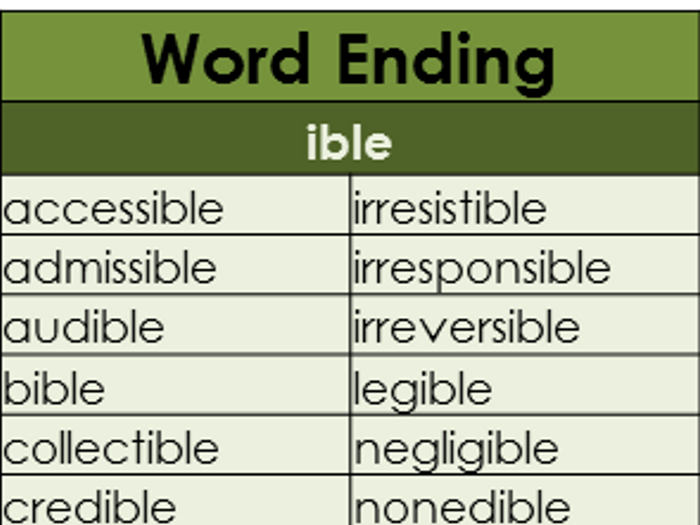
The suffix “-ible” is added to adjectives and nouns to form new adjectives. It means “capable of being” or “worthy of being.”For example, the adjective “visible” means “capable of being seen.” The noun “invincible” means “worthy of being unconquered.”There are a few rules and exceptions involved in the formation of words with the suffix “-ible.”
General Rule
The suffix “-ible” is usually added to adjectives that end in “-ate” or “-ute.” For example, “palatable” (capable of being tasted) and “soluble” (capable of being dissolved).
Exceptions
There are a few exceptions to this rule. For example, the adjectives “convertible” and “divisible” are not formed from adjectives that end in “-ate” or “-ute.”In addition, some adjectives that end in “-ible” do not have a corresponding noun. For example, the adjective “credible” (worthy of being believed) does not have a corresponding noun.
Historical Evolution
The suffix “-ible” entered the English language in the 13th century from the Latin suffix “-ibilis,” meaning “capable of being.” Initially, it was used to form adjectives describing the possibility or feasibility of an action or state, as in “possible” and “credible.”Over
time, the suffix “-ible” underwent semantic extension, broadening its scope to include adjectives denoting a passive or receptive quality, such as “visible” and “eligible.” This evolution is evident in the following examples:
13th Century:
- “Possible” (capable of being done)
- “Credible” (capable of being believed)
15th Century:, Words that have the suffix ible
- “Visible” (capable of being seen)
- “Eligible” (capable of being chosen)
The suffix “-ible” has continued to be a productive word-forming element in English, and it remains a versatile tool for expressing various semantic nuances related to capability, possibility, and receptivity.
Cross-Language Comparison
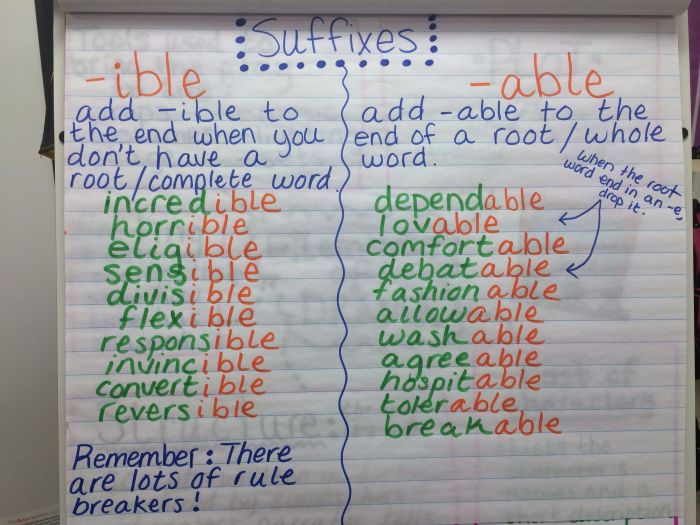
The suffix “ible” is a versatile affix that finds its presence in a diverse range of languages, extending beyond the boundaries of English. Exploring its usage across different linguistic landscapes reveals both commonalities and distinctions in its application and semantic nuances.
Similarities
- In many languages, the suffix “ible” or its equivalent conveys the notion of “ability” or “capability.” For instance, in Spanish, the suffix “-ible” is employed to form adjectives that indicate an inherent capacity, such as “posible” (possible) and “flexible” (flexible).
- The suffix often imparts a passive or receptive sense to verbs, suggesting an action that can be done or experienced. In French, for example, the suffix “-ible” transforms verbs into adjectives, indicating a susceptibility to an action. Examples include “lisible” (readable) and “visible” (visible).
Differences
- The scope of the suffix “ible” varies across languages. In English, it is primarily used to form adjectives, while in other languages, it can also be employed to create nouns and verbs. For instance, in Latin, the suffix “-ibilis” can be found in nouns like “possibilitas” (possibility) and verbs like “legibilis” (readable).
- The semantic nuances associated with the suffix “ible” can differ depending on the language. In some languages, it may convey a stronger sense of possibility or feasibility, while in others, it may imply a more conditional or limited capacity.
Conclusion
In conclusion, the suffix “ible” plays a crucial role in the English language, providing a systematic and efficient way to form adjectives that describe the capacity or possibility of an action or state. Understanding the nuances of this suffix is essential for effective communication, enabling us to convey complex ideas with precision and clarity.
By recognizing the patterns and variations associated with the suffix “ible,” we can expand our vocabulary, enhance our writing skills, and engage in more sophisticated conversations. Its versatility and widespread use make it an indispensable tool for anyone seeking to communicate effectively in English.
Clarifying Questions
What is the meaning of the suffix “ible” in English?
The suffix “ible” typically indicates capability, possibility, or suitability. It transforms root words into adjectives that describe something as being able to be done, achieved, or experienced.
Can you provide an example of a word that has the suffix “ible”?
The word “possible” is a prime example of a word that has the suffix “ible.” It means “capable of being done or achieved.”
Are there any common variations of the suffix “ible”?
Yes, the suffix “ible” has several common variations, including “-able,” “-ible,” and “-uble.” These variations are often interchangeable and convey similar meanings.